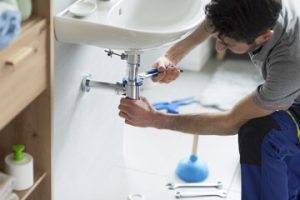When a pipe bursts or your toilet is overflowing, the right expert services can address the situation effectively. These experts can identify the root cause and apply efficient fixes, preventing further damage to your property and saving you money.
Common plumbing problems can happen at any time. They may cause a lot of inconvenience and can be expensive if left unattended. Learn how to fix the problem by clicking here at https://warriorplumbingtx.com/.

Clogged Drains
A clogged drain is more than just an inconvenience—it can lead to expensive pipe damage and flooding if not promptly addressed. Luckily, most of the causes of clogged drains are preventable.
Food waste, coffee grounds, and grease can clog kitchen sinks, while hair, soap scum, and toilet paper can clog bathroom fixtures like bathtubs and showers. Aside from avoiding these substances, homeowners can also use strainers to catch larger food scraps and keep a routine of cleaning their drains.
Paper products are a common culprit of clogged toilets, including towels, so-called “flushable” wipes, and even kitty litter, which contains sand and can easily block toilet pipes. To avoid these problems, dispose of these items in the trash or compost and use toilet paper sparingly.
Dirty water can also cause clogged drains by forming a coating that builds up on the inside of pipes, inhibiting flow. To combat dirty water, opt for a water softener to remove dissolved minerals and prevent them from clogging your drains and plumbing lines. Lastly, homeowners should regularly inspect their underground plumbing lines for root intrusion and hire professional services to perform a chemical drain line flush every couple of years. This prevents tree roots from invading and clogging drain lines. This is especially important if you live in an older home with clay or metal pipes.
Leaky Faucets
A dripping faucet may seem like a minor inconvenience, but it’s one of the most common plumbing problems homeowners face. These leaks waste gallons of water and can cause serious damage over time. The good news is that prompt plumbing repair can save you money and prevent further complications.
The main issue that causes most dripping faucets is loose parts within the faucet itself. Loose O-rings, nuts, and packing nuts create a gap that allows water to escape, resulting in leaks and drips. A plumber will typically tighten these components and replace worn seals, which will solve the problem.
Water leaking from a faucet can also indicate other underlying issues with your plumbing system. Corroded pipes, faulty valves, or high water pressure are all possible culprits that may lead to a leaky faucet if left unchecked.
If you think you have a leaky faucet, it’s important to shut off the water supply first before attempting any home repairs. This can be done by locating the main shut-off valve and twisting it clockwise. This will prevent you from accidentally showering while working on the problem and can help keep your home dry until a plumber arrives. After securing the water supply, drain the faucet and remove the handle, packing nut, and stem to access the inner workings of the faucet. Be sure to place something over the drain, such as a towel or old T-shirt, so small parts don’t fall down the drain and get lost.
Leaking Pipes
It’s almost inevitable that at some point in the lifetime of a home, it will experience some plumbing issues. From slow drains to leaky toilets, a wide variety of problems can arise that require professional help. Fortunately, many of these are avoidable by being proactive and identifying warning signs.
Leaky pipes are among the most common reasons people call a plumber. This problem is caused by various factors, including old age, high water pressure, corrosive materials, and more. The best way to prevent pipe leaks is by regular inspection and maintenance, limiting the amount of water used inside the house, and checking for potential problems like rusty fittings or loose joints.
Some homeowners attempt DIY fixes to save money, but this can be dangerous and lead to even more damage. It is possible to mend minor leaks with the right tools and a bit of patience, but it’s usually a better idea to consult with a plumber first.
A leaking pipe may cause serious water damage to the walls, ceilings, and floors of your home or building. It can also increase your water bill significantly, create a breeding ground for mold and mildew, and encourage the growth of harmful insects like cockroaches. To avoid such issues, it’s recommended to have your pipes inspected by an expert plumber at least once every five years.
Running Toilets
The toilets in your home have the longest pipes leading to them, and they are most likely to be affected by clogs and other plumbing problems. If you find more than one plumbing fixture backing up at the same time, or if there are signs of sewage around your toilets, showers, and sinks, it’s time to call in some expert services.
While it may be tempting to plunge a clogged toilet, these drains are notoriously difficult to unclog without the proper tools and experience. The most effective way to solve a clogged toilet is to use a double thrust force-cup plunger, which can get under the clog much faster than regular plungers. You can also try using a drain-clearing solution to help dissolve stubborn clogs.
A running toilet is not only irritating, but it can also waste a lot of water. A single running toilet can account for 30 percent of your household water usage! If you notice that your toilet is constantly running, turn off the water supply to stop the flow. Then, contact an expert service to determine the cause and fix it before your utility bill skyrockets.
Some plumbing issues aren’t easily fixable without the help of an expert, such as a gas leak. Never attempt to fix a gas leak yourself, as it’s extremely dangerous and can present health hazards.